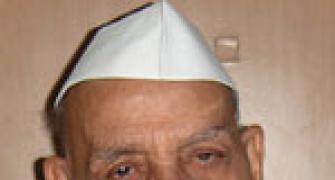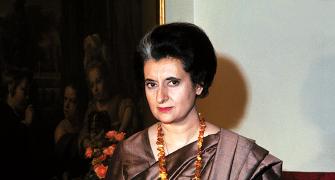A host of conspiracy theories followed, involving Indira Gandhi, her younger son Sanjay, his favourite small car project, secret funding of the Bangladesh Mukti Bahini and even the Central Intelligence Agency of the United States.

On 24 May 1971, Ved Prakash Malhotra, then the chief cashier at the Parliament Street, New Delhi, branch of State Bank of India, took out Rs 60 lakh from the cash vault to deliver it to a courier on the basis of what he claimed were instructions from the then prime minister of India, Indira Gandhi, and her secretary, P N Haksar.
He believed both of them had talked directly to him. He delivered the money to someone later identified as Rustam Sohrab Nagarwala and went to the prime minister's residence to collect the cheque for the money taken out.
He could not meet either Haksar or Mrs Gandhi. He then realised he had been duped and registered a complaint with the Parliament Street police station.
The police followed the information Malhotra had provided and apprehended Nagarwala later in the day at the Delhi Parsi dharamshala in Daryaganj.
By late evening, they recovered all but Rs 6,000 of the amount taken out of the bank, and arrested Nagarwala.
Three days later, in what has been claimed as a lightning quick trial based on Nagarwala's voluntary but unverified confession, he was convicted and sentenced to four years of imprisonment.
Assistant Superintendent D K Kashyap, an officer of the Indian Police Service, led the investigation.
Nagarwala then recanted the confession and appealed his conviction. He remained in Tihar Jail, refusing offers of friends to bail him out.
A lawyer connected with Raj Narain (who was to successfully challenge Indira Gandhi's election from Raebareli in 1971), R C Maheshwari, represented Nagarwala, but the two never trusted each other.
Kashyap died in a road accident in November 1971.
Nagarwala suffered a cardiac infarction in early 1972 and was in and out of Lord Irwin hospital. He died on March 22, 1972, his fiftieth birthday.
A host of conspiracy theories followed, involving Indira Gandhi, her younger son Sanjay, his favourite small car project, secret funding of the Bangladesh Mukti Bahini and even the Central Intelligence Agency of the United States.
The Morarji Desai government, which assumed office in 1977, appointed several commissions of inquiry to investigate the affairs of the Gandhi government and the Emergency (1975-1977).
Retired Supreme Court Justice P Jaganmohan Reddy looked into the Nagarwala case.
His voluminous report found fault with many aspects of the investigation and court proceedings, State Bank procedures, official replies, but never could find whodunit nor whydunit.
Justice Reddy even likened the case to Winston Churchill's oft-quoted 1939 description of the Soviet Union as 'a riddle wrapped in a mystery inside an enigma.'
That is where the matter remains today.

Now journalists Prakash Patra and Rasheed Kidwai have made bold to write the book under review, The Scam That Shook India (Scam hereafter) on this long-forgotten affair, after studying the declassified files of the Reddy Commission and other documents.
A reader would be justified in thinking that such an effort would be based on the discovery of some hitherto unknown or ignored clue or a new hypothesis.
Scam, however, would be a disappointment for such a reader, for it does neither.
It is, instead, a tiresome regurgitation, and repetitive at that, of what we already know about the murky affair and have been none the wiser for it.
The authors try to create atmospherics by mentioning even the most irrelevant details (the rift between Kashyap's family and the in-laws), names and places that have only the remotest connections to the case, long asides on the political situation from 1947 to 1980 (and beyond, at times) in language that can only be called police procedure prose.
Scam places remarks of long-dead people within quotation marks, giving the impression that the authors have interviewed the people being cited.
But all that they have done is paraphrase the Reddy Commission report.
Shoddy editing, evident throughout the book, further mars it: Delhi has a powerful Parsi lobby; Nagarwala was in college for four years, and left it when he was 18; he was a collegemate of the late Brigadier N B Grant, who was an engineer (but Nagarwala was not); Poona/Pune and Bombay/Mumbai appear interchangeably; the wife of the Parsi dharamshala's manager 'feels a tingle' of alarm.
This is but a tiny sampler.
The Scam that Shook India: The Nagarwala Scandal
Author: Prakash Patra & Rasheed Kidwai
Publisher: HarperCollins
Pages: xii+264
Price: Rs 399
Over the last 70-odd years, I have read countless books in different languages.
Choosing the best among them would be an impossible task.
But I can say with certainty that Scam is the worst of the lot.
I have taught courses on written communication at premier institutions.
Should I ever have another opportunity to do so, Scam would be required reading to demonstrate how not to write.
The author duo, however, are not the only ones responsible for foisting this book on us.
Anyone with pretensions to writing (this reviewer included) believes that every pearl of his wisdom must see the light of the day in the form of a book.
Presumably, publishers, especially reputed ones such as HarperCollins, have mechanisms in place to weed out sub-standard material from all the manuscripts they are offered.
In this case, that mechanism is prominent by its absence.
One mourns the felling of all the trees to enable the publication of this book.
Shreekant Sambrani is an economist based in Baroda.
Feature Presentation: Aslam Hunani/Rediff.com











